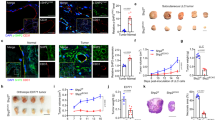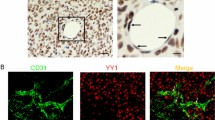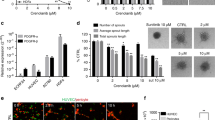Abstract
Although the effects of vascular endothelial growth factor (VEGF) on angiogenesis and vascular function are well known, the effects of VEGF on tumor cell function remain to be elucidated. We studied phenotypic changes in human colorectal cancer (CRC) cells with homozygous deletion of VEGF alleles to determine the potential direct role of VEGF on tumor cell function. Loss of VEGF expression led to significantly decreased cell growth and increased spontaneous apoptosis in CRC cells (P<0.01). Loss of VEGF also increased the in vitro sensitivity of cells to the cytotoxic effects of the chemotherapeutic drug 5-fluorouracil, as shown by increased apoptosis (P<0.05). These effects were mediated via upregulation of the proapoptotic mediators caspase-3, cleaved PARP and Bax and downregulation of the pro-survival mediator survivin. Our findings suggest a novel and distinct function of VEGF in mediating autocrine/intracrine CRC cell survival.
This is a preview of subscription content, access via your institution
Access options
Subscribe to this journal
Receive 50 print issues and online access
$259.00 per year
only $5.18 per issue
Buy this article
- Purchase on Springer Link
- Instant access to full article PDF
Prices may be subject to local taxes which are calculated during checkout




Similar content being viewed by others
References
Bachelder RE, Crago A, Chung J, Wendt MA, Shaw LM, Robinson G et al. (2001). Vascular endothelial growth factor is an autocrine survival factor for neuropilin-expressing breast carcinoma cells. Cancer Res 61: 5736–5740.
Barr MP, Bouchier-Hayes DJ, Harmey JJ . (2008). Vascular endothelial growth factor is an autocrine survival factor for breast tumour cells under hypoxia. Int J Oncol 32: 41–48.
Brown LF, Detmar M, Claffey K, Nagy JA, Feng D, Dvorak AM et al. (1997). Vascular permeability factor/vascular endothelial growth factor: a multifunctional angiogenic cytokine. EXS 79: 233–269.
Calvani M, Trisciuoglio D, Bergamaschi C, Shoemaker RH, Melillo G . (2008). Differential involvement of vascular endothelial growth factor in the survival of hypoxic colon cancer cells. Cancer Res 68: 285–291.
Carmeliet P, Ferreira V, Breier G, Pollefeyt S, Kieckens L, Gertsenstein M et al. (1996). Abnormal blood vessel development and lethality in embryos lacking a single VEGF allele. Nature 380: 435–439.
Cohen GM . (1997). Caspases: the executioners of apoptosis. Biochem J 326 (Pt 1): 1–16.
Connolly DT, Heuvelman DM, Nelson R, Olander JV, Eppley BL, Delfino JJ et al. (1989). Tumor vascular permeability factor stimulates endothelial cell growth and angiogenesis. J Clin Invest 84: 1470–1478.
Cryns V, Yuan J . (1998). Proteases to die for. Genes Dev 12: 1551–1570.
Dang DT, Chen F, Gardner LB, Cummins JM, Rago C, Bunz F et al. (2006). Hypoxia-inducible factor-1alpha promotes nonhypoxia-mediated proliferation in colon cancer cells and xenografts. Cancer Res 66: 1684–1936.
Dias S, Shmelkov SV, Lam G, Rafii S . (2002). VEGF(165) promotes survival of leukemic cells by Hsp90-mediated induction of Bcl-2 expression and apoptosis inhibition. Blood 99: 2532–2540.
Escudier B, Eisen T, Stadler WM, Szczylik C, Oudard S, Staehler M et al. (2009). Sorafenib for treatment of renal cell carcinoma: final efficacy and safety results of the phase III treatment approaches in renal cancer global evaluation trial. J Clin Oncol 27: 3312–3318.
Fan F, Wey JS, McCarty MF, Belcheva A, Liu W, Bauer TW et al. (2005). Expression and function of vascular endothelial growth factor receptor-1 on human colorectal cancer cells. Oncogene 24: 2647–2653.
Ferrara N, Carver-Moore K, Chen H, Dowd M, Lu L, O'Shea KS et al. (1996). Heterozygous embryonic lethality induced by targeted inactivation of the VEGF gene. Nature 380: 439–442.
Ferrara N, Gerber HP, LeCouter J . (2003). The biology of VEGF and its receptors. Nat Med 9: 669–676.
Gerber HP, Malik AK, Solar GP, Sherman D, Liang XH, Meng G et al. (2002). VEGF regulates haematopoietic stem cell survival by an internal autocrine loop mechanism. Nature 417: 954–958.
Gerber HP, McMurtrey A, Kowalski J, Yan M, Keyt BA, Dixit V et al. (1998). Vascular endothelial growth factor regulates endothelial cell survival through the phosphatidylinositol 3′-kinase/Akt signal transduction pathway. Requirement for Flk-1/KDR activation. J Biol Chem 273: 30336–30343.
Houck KA, Ferrara N, Winer J, Cachianes G, Li B, Leung DW . (1991). The vascular endothelial growth factor family: identification of a fourth molecular species and characterization of alternative splicing of RNA. Mol Endocrinol 5: 1806–1814.
Hutchings H, Ortega N, Plouet J . (2003). Extracellular matrix-bound vascular endothelial growth factor promotes endothelial cell adhesion, migration, and survival through integrin ligation. FASEB J 17: 1520–1522.
Lee S, Chen TT, Barber CL, Jordan MC, Murdock J, Desai S et al. (2007a). Autocrine VEGF signaling is required for vascular homeostasis. Cell 130: 691–703.
Lee TH, Seng S, Sekine M, Hinton C, Fu Y, Avraham HK et al. (2007b). Vascular endothelial growth factor mediates intracrine survival in human breast carcinoma cells through internally expressed VEGFR1/FLT1. PLoS Med 4: e186.
Leung DW, Cachianes G, Kuang WJ, Goeddel DV, Ferrara N . (1989). Vascular endothelial growth factor is a secreted angiogenic mitogen. Science 246: 1306–1309.
Lichtenberger BM, Tan PK, Niederleithner H, Ferrara N, Petzelbauer P, Sibilia M . (2010). Autocrine VEGF signaling synergizes with EGFR in tumor cells to promote epithelial cancer development. Cell 140: 268–279.
Masuda K, Teshima-Kondo S, Mukaijo M, Yamagishi N, Nishikawa Y, Nishida K et al. (2008). A novel tumor-promoting function residing in the 5′ non-coding region of vascular endothelial growth factor mRNA. PLoS Med 5: e94.
Nor JE, Christensen J, Liu J, Peters M, Mooney DJ, Strieter RM et al. (2001). Up-Regulation of Bcl-2 in microvascular endothelial cells enhances intratumoral angiogenesis and accelerates tumor growth. Cancer Res 61: 2183–2188.
Pidgeon GP, Barr MP, Harmey JH, Foley DA, Bouchier-Hayes DJ . (2001). Vascular endothelial growth factor (VEGF) upregulates BCL-2 and inhibits apoptosis in human and murine mammary adenocarcinoma cells. Br J Cancer 85: 273–278.
Rini BI, Halabi S, Rosenberg JE, Stadler WM, Vaena DA, Ou S-S et al. (2008). Bevacizumab plus interferon alfa compared with interferon alfa monotherapy in patients with metastatic renal cell carcinoma: CALGB 90206. J Clin Oncol 26: 5422–5428.
Santos SC, Dias S . (2004). Internal and external autocrine VEGF/KDR loops regulate survival of subsets of acute leukemia through distinct signaling pathways. Blood 103: 3883–3889.
Senger DR, Galli SJ, Dvorak AM, Perruzzi CA, Harvey VS, Dvorak HF . (1983). Tumor cells secrete a vascular permeability factor that promotes accumulation of ascites fluid. Science 219: 983–985.
Senger DR, Perruzzi CA, Feder J, Dvorak HF . (1986). A highly conserved vascular permeability factor secreted by a variety of human and rodent tumor cell lines. Cancer Res 46: 5629–5632.
Tischer E, Mitchell R, Hartman T, Silva M, Gospodarowicz D, Fiddes JC et al. (1991). The human gene for vascular endothelial growth factor. Multiple protein forms are encoded through alternative exon splicing. J Biol Chem 266: 11947–11954.
Vincent L, Jin DK, Karajannis MA, Shido K, Hooper AT, Rashbaum WK et al. (2005). Fetal stromal-dependent paracrine and intracrine vascular endothelial growth factor-a/vascular endothelial growth factor receptor-1 signaling promotes proliferation and motility of human primary myeloma cells. Cancer Res 65: 3185–3192.
Acknowledgements
We thank the Cytometry and Cellular Imaging Core Facility at M. D. Anderson Cancer Center (funded by NIH Cancer Center Support Grant CA016672) for assistance with data analysis using the flow cytometers. We thank Sunita Patterson (Department of Scientific Publications) for manuscript editing and Rita Hernandez for editorial assistance. This work was supported by the RE ‘Bob’ Smith Fund for Cancer Research (SS), NIH grants CCSG CA016672, T32 CA09599 (PG), R01 CA112390 (LME), and the William C Liedtke Chair in Cancer Research.
Author information
Authors and Affiliations
Corresponding author
Ethics declarations
Competing interests
LM Ellis received honoraria from Genentech/Roche. The other authors declare no conflict of interest.
Additional information
Supplementary Information accompanies the paper on the Oncogene website
Rights and permissions
About this article
Cite this article
Samuel, S., Fan, F., Dang, L. et al. Intracrine vascular endothelial growth factor signaling in survival and chemoresistance of human colorectal cancer cells. Oncogene 30, 1205–1212 (2011). https://doi.org/10.1038/onc.2010.496
Received:
Revised:
Accepted:
Published:
Issue Date:
DOI: https://doi.org/10.1038/onc.2010.496
Keywords
This article is cited by
-
Brevilin A is a potent anti-metastatic CRC agent that targets the VEGF-IL6-STAT3 axis in the HSCs-CRC interplay
Journal of Translational Medicine (2023)
-
The role of glycosyltransferase enzyme GCNT3 in colon and ovarian cancer prognosis and chemoresistance
Scientific Reports (2018)
-
Granulocyte-colony-stimulating factor-producing metaplastic carcinoma of the breast with significant elevation of serum interleukin-17 and vascular endothelial growth factor levels
International Cancer Conference Journal (2018)
-
Intracrine VEGF signalling mediates colorectal cancer cell migration and invasion
British Journal of Cancer (2017)
-
miRNA-205 targets VEGFA and FGF2 and regulates resistance to chemotherapeutics in breast cancer
Cell Death & Disease (2016)



